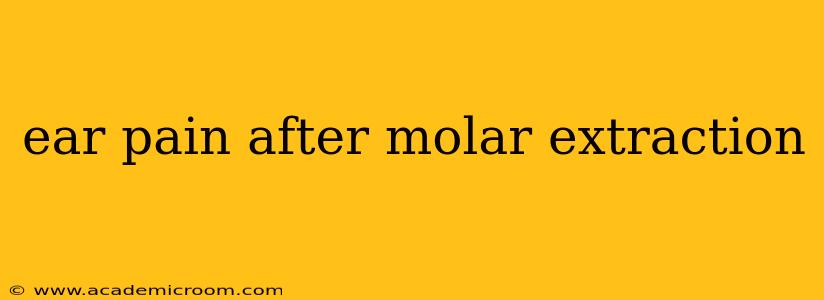Experiencing ear pain after a molar extraction is a common occurrence, often causing significant discomfort and worry. While it might seem unrelated, the proximity of the molar to the ear and the intricate network of nerves and tissues in the jaw can easily lead to referred pain. Understanding the causes, potential treatments, and preventative measures can help manage this post-operative complication effectively.
Why Does My Ear Hurt After a Tooth Extraction?
The connection between your molar and your ear pain stems from the intricate anatomy of your head and neck. Several factors contribute to this referred pain:
-
Nerve Irritation: The trigeminal nerve, a major nerve responsible for sensation in the face and jaw, branches extensively. During molar extraction, this nerve or its branches can be inadvertently irritated, leading to pain radiating to the ear. Swelling and inflammation surrounding the extraction site can also put pressure on these nerves, exacerbating the pain.
-
Sinus Issues: The roots of upper molars are often close to the maxillary sinuses. Extraction can sometimes disrupt the sinus lining, leading to sinus inflammation and referred pain to the ear, particularly if you experience post-extraction sinusitis.
-
Infection: While less common, a post-extraction infection can spread to surrounding tissues, including those associated with the ear, leading to pain and other symptoms such as swelling, fever, and increased sensitivity to touch.
-
Dry Socket: A dry socket (alveolar osteitis) occurs when the blood clot protecting the extraction site is dislodged or fails to form properly. This exposes the underlying bone, leading to severe pain that can radiate to the ear and other areas of the face.
-
Muscle Tension: The jaw muscles are closely connected to the ear area. Pain from the extraction site, coupled with clenching or grinding your teeth, can lead to muscle tension and referred pain.
What Should I Do If I Have Ear Pain After a Tooth Extraction?
If you experience ear pain after a molar extraction, it's crucial to contact your dentist or oral surgeon immediately. They can assess the situation, determine the underlying cause, and recommend the appropriate treatment. Self-treating can be risky and might delay proper care.
Is Ear Pain After Tooth Extraction Normal?
While some mild discomfort is expected after a molar extraction, significant ear pain is not considered normal. It warrants immediate attention from your dental professional.
How Long Does Ear Pain Last After Tooth Extraction?
The duration of ear pain varies greatly depending on the cause and the individual. It can range from a few days to several weeks. If the pain persists for an extended period, especially if accompanied by other symptoms, seek medical attention.
How Can I Treat Ear Pain After a Tooth Extraction at Home (Temporarily)?
While you should consult your dentist for proper treatment, some temporary home remedies might help alleviate the discomfort. These include:
- Over-the-counter pain relievers: Ibuprofen or acetaminophen can help manage pain and inflammation. Always follow the recommended dosage.
- Warm or cold compresses: Applying warm or cold compresses to the affected area might provide some relief. Experiment with both to see which works better for you.
- Rest: Getting adequate rest allows your body to heal more efficiently.
- Gentle rinsing: Gently rinsing your mouth with salt water can help keep the extraction site clean and reduce inflammation.
Preventing Ear Pain After Molar Extraction
While not all cases of ear pain are preventable, proactive measures can reduce the risk:
- Follow post-operative instructions diligently: Your dentist or oral surgeon will provide detailed instructions on post-operative care. Adhering to these instructions is crucial for proper healing.
- Maintain good oral hygiene: Proper oral hygiene before and after the extraction significantly reduces the risk of infection.
- Avoid smoking: Smoking impairs healing and increases the risk of dry socket.
- Avoid strenuous activities: Rest and avoid strenuous activities immediately following the extraction.
Disclaimer: This information is intended for educational purposes only and does not constitute medical advice. Always consult with a qualified dentist or oral surgeon for diagnosis and treatment of any oral health concerns. They can provide personalized recommendations based on your specific situation.
